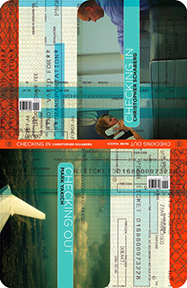I will fly more than 200,000 miles this year. It routinizes, like an extended commute. The suburbanite knows every moment of the drive: on-ramp, lane-change, morning-show, cup-holder. I'm like that, but on a global vector: freeway, parking lot, door S-3, South security checkpoint, wallet, shoes, laptop, zip-lock, escalator, train, SkyClub, jetway, seat, jacket, bourbon, nap, tarmac, sky, sky, sky.
We frequent flyers are the wizened, aged elders to the leisure traveler cherubim. Our vacant glances tousle your collective heads. We are the aviary aristocracy. Coach is a curious memory, a favela from a forgotten youth. An Atlantis that sank into the fuselage.
We can go ten days in the 18" roll-aboard. With three suits. With an umbrella. We know the order of the fare classes. We know how to Q-UP. We do not complain about delays or IROPs. We were going to be on a plane anyway, or a hotel, or a conference center. We are unfazed, save by the fazed whose perturbedness perturbs us. We have broken the wild stallion whose nostrils flare with the steam of tarmac. We have resisted the siren whose bright blueness stares us down through oval portals.
"Frequent flyer" is misleading. So frequent is the frequency that the ground becomes the figure, the sky the ground. We are the sometimes-grounded.
We have eaten all the meals they don't serve you. Domestic: check the flight number. Orders are taken from the front on even flights, back on odd; we choose seats early to avoid the wet sandwich. International: we've already eaten the filet of beef with demi glace sauce, the curried chicken, even the pan seared cod. Even the cold plate of roast beef and gravlax. We're considering the strozzapreti. Not from desperation nor vegetarianism, but just from ennui. Eventually we stop ordering anything. A flying problem is the opposite of a drinking problem: it starts when you lose interest in the free booze.
Like grandfathers or autistics, we do not speak except to remark about those who violate the custom. Social rites develop only around circumstances of unpredictable exception. The window seat is a two-hour renewable contract not to use the lavatory. Or the primary ritual: on the 752 or the 763, will the jetway dock at the first or the second door? We stoop and crane to see, looking out the windows for the first time. Then we all turn accordingly, silently, like synchronized swimmers with iPhones. Like migrating birds with elite status wing tags.
Eventually, the flights seep out from the planes, from the airports like mercury. Slowly they cover things. We do not own toiletries larger than 3.4oz. Every jacket pocket contains an old boarding pass. We long since gave up bringing home souvenirs in favor of airplane cookies. Our children hug us and ask, "did you bring airplane cookies?" Of course we did. Every jacket pocket contains an old boarding pass and a Biscoff cookie. Sometimes we eat one, like a Proustian madeleine. The cinnamon sweetness tastes like cabin pressure and pale loneliness and turbofan hum.
There are amateurs and there are experts. Or better, there are initiates and there are the initiated. The flipside of strangeness is habituation. It's true in all things. The dentist for whom every day is a day at the dentist. The pastry chef who pipes special occasions into indistinction. The wary schoolboy who becomes the weary schoolboy. The traveler who becomes the frequent flyer.
Ian Bogost is Professor of Digital Media at the Georgia Institute of Technology. He is the author of seven books, most recently How To Do Things with Videogames. His most recent game, A Slow Year, is a collection of game poems for Atari. It won the Vanguard and Virtuoso awards at the 2010 Indiecade Festival.






